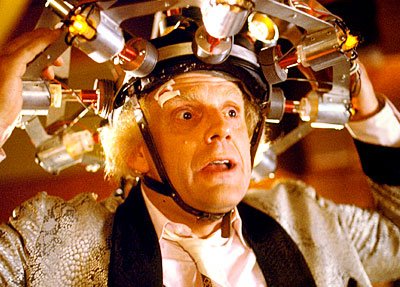Study: Gaming skills improved through mild shocks to the head
Centuries old electric technique shown to increase cognitive functions
Wish you could pwn noobs like the best of them? Try taping a battery to your head*. A recent study suggests players can double their gaming skills simply by applying a 9-volt battery to their temples and subjecting themselves to tiny jolts of electricity.

Called transcranial direct-current stimulation (tDCS), the practice of shocking a subject into faster learning has been around since the 18th century, but was recently explored using modern techniquesin a research studyout ofAlbuquerque, New Mexico. In it, volunteers were asked to play a war simulator called DARWARS Ambush! , which tested their ability to react quickly to sniper fire and other instances of sudden danger. All players were equipped with a wet sponge and battery attached to their scalps which gave out varying degrees of electric outputs. Those that received 2 milliamps (1/500th that of an average light bulb) demonstrated the ability to learn the game twice as fast as those who received a drastically reduced amount of juice to the head.
The study was funded by the US Defense Advanced Research Projects Agency and conducted in part by Vincent Clark, a neuroscientist at the University of New Mexico who believes tDCS applications are "going to explode very soon and give us all sorts of new information and new questions". According to Nature.com, some forward thinking gamers have already attempted assembling their ownelectric smarthatat homes, but stopped doing so once they startedbegan to seeflashing lights.
"With wires and batteries and home hobbyists trying to run electricity through their heads, somebody could get hurt,"added Martha Farah, a neuroethicist at the University of Pennsylvania in Philadelphia.
Clark, Farah, and the other experts inNature's in-depth articleon tDCS agree we should wait and see where the research goes before getting too excited about its real-world applications. Not to say Nintendo shouldn't go ahead and create a Wii Thinking Cap, just that you should watch your friends (and/or enemies) try it first.
*GamesRadar does not endorse the strapping of any electrical devices to one's head, nor does it recommend responding toads for human test subjectsin New Mexico without first doing your research and negotiating a fair price.
[Source:NatureviaGameinformer]
Apr 18, 2011
Sign up to the GamesRadar+ Newsletter
Weekly digests, tales from the communities you love, and more
Got a news tip? Let us know attips@gamesradar.com

Called transcranial direct-current stimulation (tDCS), the practice of shocking a subject into faster learning has been around since the 18th century, but was recently explored using modern techniquesin a research studyout ofAlbuquerque, New Mexico. In it, volunteers were asked to play a war simulator called DARWARS Ambush! , which tested their ability to react quickly to sniper fire and other instances of sudden danger. All players were equipped with a wet sponge and battery attached to their scalps which gave out varying degrees of electric outputs. Those that received 2 milliamps (1/500th that of an average light bulb) demonstrated the ability to learn the game twice as fast as those who received a drastically reduced amount of juice to the head.
The study was funded by the US Defense Advanced Research Projects Agency and conducted in part by Vincent Clark, a neuroscientist at the University of New Mexico who believes tDCS applications are "going to explode very soon and give us all sorts of new information and new questions". According to Nature.com, some forward thinking gamers have already attempted assembling their ownelectric smarthatat homes, but stopped doing so once they startedbegan to seeflashing lights.
"With wires and batteries and home hobbyists trying to run electricity through their heads, somebody could get hurt,"added Martha Farah, a neuroethicist at the University of Pennsylvania in Philadelphia.
Clark, Farah, and the other experts inNature's in-depth articleon tDCS agree we should wait and see where the research goes before getting too excited about its real-world applications. Not to say Nintendo shouldn't go ahead and create a Wii Thinking Cap, just that you should watch your friends (and/or enemies) try it first.
*GamesRadar does not endorse the strapping of any electrical devices to one's head, nor does it recommend responding toads for human test subjectsin New Mexico without first doing your research and negotiating a fair price.
[Source:NatureviaGameinformer]
Apr 18, 2011
Got a news tip? Let us know attips@gamesradar.com
Matt Bradford wrote news and features here at GamesRadar+ until 2016. Since then he's gone on to work with the Guinness World Records, acting as writer and researcher for the annual Gamer's Edition series of books, and has worked as an editor, technical writer, and voice actor. Matt is now a freelance journalist and editor, generating copy across a multitude of industries.


